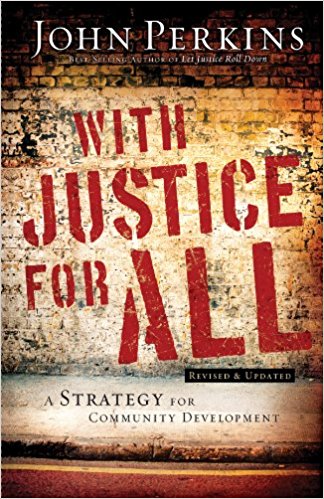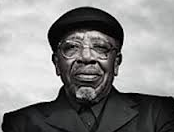Book Review: With Justice for All by John Perkins

This review was written by VJN intern Sydney Wilson. Sydney is a psychology major at Liberty University.
With Justice For All is an excellent book focusing on reconciliation and justice between different ethnic and racial groups. Growing up in a small, racially discriminative town in Mississippi, Perkins passion for the Lord told him that there needed to be a better way to do life than what was currently his reality. He began reaching out to other black members of the community to begin sharing the gospel and worshipping, however in that time a pastor was only considered full time if he operated 3-4 churches. Therefore, he could only pastor any given church about once a month. Clearly this made consistency and accountability an issue and the congregation began to take issue wanting a church service every week. From this issue, Perkins developed a rotational service schedule where he and several other pastors would rotate through the same four churches, making it possible for a pastor to be at every church every week.
After some time, Perkins and some of his friends were lured into a trap where they were attacked and thrown in jail simply because of the color of their skin. That night, Perkins says, he felt the Lord laid it on his heart that it was time to begin reaching out to the white folk too.
He began developing a three step plan to help unify the black and white churches in Mississippi. The first of these steps is relocation. In this section of the book, Perkins talks about how it is almost impossible to understand the needs and the wants of any given community if you are on the outside looking in on them. The only way to truly understand the way a community works is to fully immerse yourself into the culture and live the way they live. He gives the example of Jesus at the well where he goes through Samaria, which was culturally unclean and unusual for people to pass through. Perkins points out that Jesus didn’t stand on the outside and see the women and give her what he thought she needed. He went into her neighborhood, established a connection with her and found out that her real need was the Water of Life.
 The second step for community development is reconciliation. Perkins states that reconciliation is not an optional aspect of the Christian faith. John 13:34-35 talks about how it is essential that we love each other as Christ loved us and that is how the world will know we are sons and daughters of the Lord. If we do not reconcile ourselves to God and to other people regardless of race, culture or socioeconomic status we will never be able to expand the kingdom.
The second step for community development is reconciliation. Perkins states that reconciliation is not an optional aspect of the Christian faith. John 13:34-35 talks about how it is essential that we love each other as Christ loved us and that is how the world will know we are sons and daughters of the Lord. If we do not reconcile ourselves to God and to other people regardless of race, culture or socioeconomic status we will never be able to expand the kingdom.
The third and final step to community development through the eyes of John Perkins is redistribution. The gospel calls us time and again to give to those in need. Perkins discusses that while this may be financial, it doesn’t have to be. It is equally as important to give people in need our time, our energy, our resources and our skills.
At the end of the day, the Lord calls us to take care of each other and love each other as He loves all of us. To do the things that VJN promotes doing, it is imperative to do these three steps to reach those who are hurting and reconcile believers. While the words of this book focus specifically on reconciling the black church to the white church, as was the issue at the time of publication, the concepts of this book can be applied to many situations including cross cultural mission work, or working with people of different socioeconomic backgrounds. Whatever the situation, it is vital to keep the Lord at the center and focus on what His calling is instead of what the world desires.
